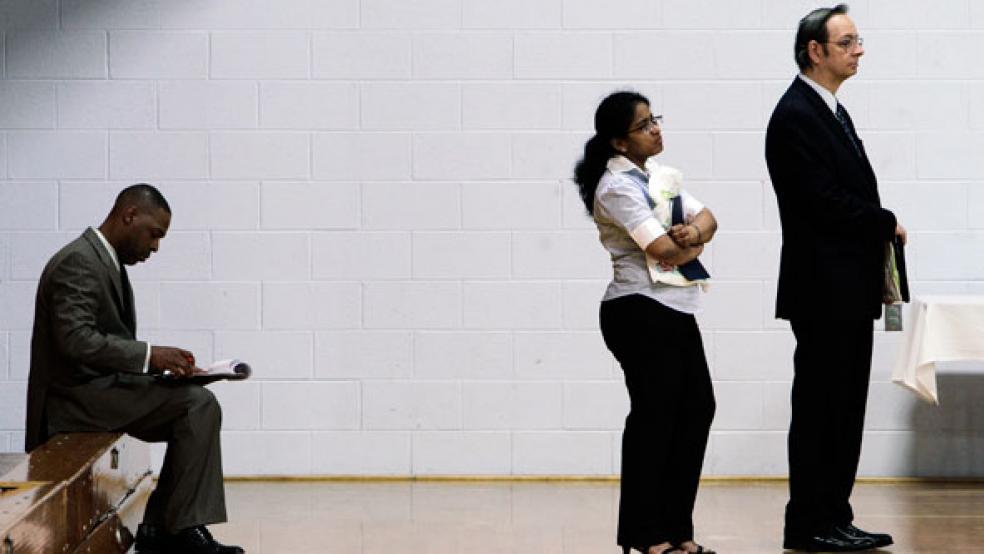President Obama at a press conference on Monday returned to the theme that the prolonged debt -ceiling negotiations are sapping business confidence and undermining the economic recovery.
“I do think that if the country as a whole sees Washington act responsibly, compromises being made, the deficit and debt being dealt with for 10, 15, 20 years, that will help with businesses feeling more confident about aggressively investing in this country…” he said. “And so it can have a positive impact on overall growth and employment.”
In a brief appearance Friday, Obama listed a litany of reasons for the economy’s weak jobs performance in June: Natural disasters, high gas prices, state and local budget cuts, the Greek debt crisis.
But there was something new on his list. “Uncertainty over whether the debt limit here in the United States will be raised [has] also made businesses hesitant to invest more aggressively,” he said.
Is Washington’s brinkmanship during the prolonged debt-ceiling talks sapping corporate confidence and retarding the pace of economic recovery? Business and bank economists contacted Friday said a much larger problem is the sharp withdrawal of spending that is taking place across the country at every governmental level.
If you include the loss of temporary census jobs created during 2010, the nation has shed nearly 1 million government jobs in the past year. State and local governments have eliminated 577,000 jobs since the middle of 2008.
Friday’s jobs report, which showed a paltry gain of 18,000 jobs, actually showed a 57,000 job gain in the private sector. Governments last month cut 39,000 jobs on top of the 48,000 jobs cut the previous months.
The next several months are likely to be significantly worse on the government jobs front. Numerous states, no longer benefitting from federal stimulus money that prevented sharp layoffs in 2009 and 2010, have passed budget in recent weeks that will sharply reduce school budgets across the country.
Tens of thousands of teachers and other school employees in Texas are already slated for layoffs. Nationwide the totals could reach well into six figures.
Meanwhile, crucial income supports for the unemployed are being withdrawn as states cut back extended benefits for the long-term jobless. A report released by Moody’s Analytics over the weekend points out that 20 percent of all national income comes from transfer payments like Social Security, disability, and unemployment insurance, with the level of benefits for the latter now being three times their pre-recession levels. Every dollar of income-transfer payments translates into $2 in consumer spending, which accounts for 60 to 70 percent of all economic activity.
Yet the debate in Washington is between Republicans who want to cut as many government jobs as is necessary to bring the budget into balance versus a White House that wants to shrink the government at a slower pace, tempered by tax increases that would also pull money out of the economy. “When people say you cut spending you create jobs, I’m sorry. When you cut jobs, it hurts growth,” said Diane Swonk, chief economist at Mesirow Financial in Chicago.
In an eerie harbinger of what could happen to the federal level next month, Minnesota state government shut down over the July 4th weekend as a Democratic governor and Republican legislature remained deadlocked over the levels of spending cuts and tax increases needed to brings its state budget into balance. Twenty thousand state workers have been furloughed and will soon join the unemployment rolls unless a deal gets struck.
While they wait, the shutdown is having ramifications far beyond state parks and motor vehicle offices. A host of businesses will soon feel the brunt of state cutbacks.
“Companies that depend on government spending – like road construction – will be impacted very soon,” says Scott Anderson, a senior economist at Wells Fargo Economics in Minneapolis, where an interstate highway bridge fell into the Mississippi River four years ago. “The winter snows hit very early here. Right now, nothing’s going on. Potholes aren’t being filled.”
Other economists pointed to trends in government interest rates as proof that investor confidence isn’t a primary cause of declining investment. “It’s difficult to see it in financial markets,” says Gus Faucher, chief of macroeconomics at Moody Analytics. “Rates remain very, very low.”
Interest rates on every Treasury maturity six months or longer fell during the first week in July, while the yields on one-month T-bills went from a microscopic one-one hundredth of one percent to three-one hundredths of one percent. Of course, you could look on the dark side and say that short-term interest rates tripled, signaling there is at least some fear that the government may not get its act together and raise the debt ceiling.
The economists were united on one question: what would happen if the debt-ceiling talks collapse. “It would push the economy into a recession within a month,” says Faucher. “What would it mean if the government doesn’t meet its obligations to beneficiaries or to defense contractors? You’d see stock prices plummet and interest rates spike.”
More on the debt-ceiling standoff at The Fiscal Times:
Right Debt-Ceiling Deal Could Stoke the Market
Stocks Tumble Following Disappointing Jobs Report
Dismal Jobs Numbers Fuel Fears of Double-Dip Recession





